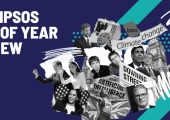Ipsos and King's College International Development Institute release new research on emerging markets
A new survey by Ipsos for King's College International Development Institute of public attitudes in the emerging markets reveals that despite an economic downturn and political troubles, the USA is still considered the country to look to for the right ideas about the economy and jobs.
 A new survey of public attitudes in the emerging markets reveals that despite an economic downturn and political troubles, the USA is still considered the country to look to for the right ideas about the economy and jobs.
A new survey of public attitudes in the emerging markets reveals that despite an economic downturn and political troubles, the USA is still considered the country to look to for the right ideas about the economy and jobs.
The research into public perceptions about growth and prosperity in the BRIC countries and other emerging markets was conducted online by Ipsos and King’s College London. The survey results are being released to mark the launch of King’s International Development Institute (IDI) this week – a new dedicated centre for research into the emerging economies and lessons that can be learned from their rapid economic growth and societal changes.
The survey asked people of different ages and socio-economic backgrounds which countries have the right ideas about the economy and jobs, and which countries they think will be the leading global economic power over the next two decades.
The findings reveal that, in spite of an economic downturn, people from emerging markets still choose the US as the best for providing job opportunities for young people (29%). This is almost twice as many as those who believe it is either China (17%) or the EU (18%).
Both China and the USA are considered the top two for having right ideas about the economy and employment opportunities now (28% to 26%). The US lead is strongest among young people (Under 35s) while China has a similar lead with the oldest group surveyed (aged 50-64). The US is also particularly popular for having the right ideas on economic growth and employment in India (43%), Mexico (41%, South Africa (39%) and Brazil (38%).
Looking ahead, however, over half (52%) believe China will be the next leading economic power in the next two decades, giving it a 22 point lead over the US. The EU trails behind at 12%, only marginally ahead of Russia (11%) and India (10%), however, its popularity rises among those with a higher level of education (24%).
Within the BRIC nations, the public feel confident that their own countries will be among the economic powers in the future, but aside from China, have little confidence in each other as global, economic leaders.
Dr Andy Sumner, Co-Director, King’s International Development Institute, said:
‘It is surprising to see that the US and China are now just a whisker apart – it seems as though it’s the Washington consensus of market-friendly economic development neck and neck with a more state-led Beijing consensus in the race for global ideas leadership.
‘The rest of the ‘BRICS’ group nations don’t feature prominently, which surprises me and makes one wonder if the emphasis given to that particular grouping needs a rethink.’
Bobby Duffy, Managing Director of Ipsos’s Social Institute said:
‘This survey is interesting in the sense that it’s not of experts or economists, but of the public in these key developing economies, therefore delivers a general measure of mood, of who is seen to be on the up or heading down. ‘In particular, the poor showing of the EU among the general population in emerging markets comes as no surprise, considering the widespread coverage of economic difficulties across the continent. It is important for Europe’s future that this image does not take hold. The higher rating of the EU among those with higher levels of education is at least a more promising finding.’
Technical Note
- Eleven emerging nations were surveyed: Brazil, Argentina, Russia, Turkey, Saudi Arabia, South Africa, India, China, South Korea, Indonesia and Mexico.
- The survey was conducted online using Ipsos’ Online Panels in October 2013. Respondents were the general population, aged 16-64, with the exception of China, India and South Africa where the sample is made up of more affluent adults.
- Approximately 1000+ individuals were surveyed in Brazil, China and India. For the rest of the countries, 500+ were surveyed.
- Data are weighted within country by age, gender and education. For the ‘global’ average, each country is given an equal weighting.
- Questions asked: (Q1) Which country or countries, if any, do you think have the right ideas about the economy and jobs that your country's leaders should copy? (Q2) Which country or countries, if any, do you think provide the best job opportunities for young people today? (Q3) Which country or countries, if any, do you think will be the leading economic powers of the world over the next 20 years? Please note that Questions 1 and 2 were not asked in China due to a decision taken by the advisory panel.
More insights about Public Sector



